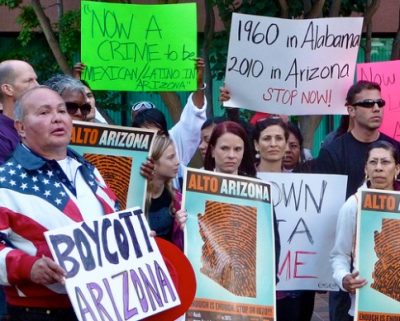State and Local

Forward March: Hundreds of Thousands Took to the Streets Demanding Immigration Reform
Sparked by Arizona’s anti-immigration enforcement law, hundreds of thousands of protesters took to the streets on Saturday to demand congressional action on immigration reform. Carrying signs that read “Do I Look Illegal?” and “We are All Arizona,” labor, student, civil rights and immigration activists gathered in more than 70 cities nationwide (including Washington, D.C., Los Angeles, Dallas, Chicago, Milwaukee and San Francisco) with one united message—we need immigration reform now. Read More

Arizona’s Punishing New Immigration Law Doesn’t Fight Crime
Supporters of Arizona’s harsh new immigration law claim that it is, among other things, a potent tool in the crime-fighting arsenal. For instance, the bill’s author, Republican State Senator Russell Pearce of Mesa, confidently predicts that the law—which requires police to investigate the immigration status of anyone who appears to be unauthorized—will result in “less crime” and “safer neighborhoods.” However, Sen. Pearce overlooks two crucial points: crime rates have already been falling in Arizona for years despite the presence of unauthorized immigrants, and a century’s worth of research has demonstrated that immigrants are less likely to commit crimes or be behind bars than the native-born. Moreover, the law is likely to distract the police from investigating non-immigration related crimes and dissuade immigrants from cooperating with the police, making neighborhoods less safe. Read More

New Arizona Enforcement Law Sparks Calls for Economic Boycott
Arizona’s new controversial enforcement law, signed into law last week by Gov. Jan Brewer, has the potential to shake down more than just undocumented immigrants and suntanned citizens. Arizona’s businesses and tourism industry are also likely to take a hit as more and more people call for an economic boycott. The law, which requires state and local law enforcement to check the documents of people they “reasonable suspect” of being here illegally, is causing many potential investors, visitors and tourists to avoid Arizona altogether. With a state budget deficit of more than $4.5 billion and an economy heavily dependent on tourism, Gov. Jan Brewer (who’s up for reelection this November) and the Arizona legislature will need to consider not only how they plan on paying for implementation of this new law, but also how to pay the larger price of doing business in a restrictionist state. Read More

Can Arizona Afford to Implement S.B. 1070?
As the deadline for signing/vetoing Arizona’s immigration enforcement law (S.B. 1070) draws near, Arizona Governor Jan Brewer has more than just the moral and ethical implications of the law to consider. The proposed “Support Our Law Enforcement and Safe Neighborhoods Act,” a bill that makes it a misdemeanor to fail to carry proper immigration documents and requires police to determine a person’s immigration status, could come with heftier price tag than people may realize. While the Arizona legislature has not yet determined the costs associated with S.B. 1070 (the state legislature failed to attribute a cost in their attached fiscal note), several economic indicators reveal the potential cost of implementation to Arizona taxpayers and the residual consequences of driving unauthorized immigrations out of Arizona. Read More

Local Enforcement of Immigration Laws Through the 287(g) Program
Updated 04/02/10 Since 2004, the Immigration and Customs Enforcement Agency (ICE) has greatly expanded its partnerships with local police through the 287(g) program. As of March 2010, more than 1,075 local officers have been trained and certified through the program under the 67 active Memoranda of Agreement (MOAs) in 24 states. However, while the number of MOAs has increased, the numerous problems surrounding them have also become more apparent. Recent reports have found that 287(g) agreements are costing localities millions to implement while ICE provides little oversight and support to the program. Additionally, crime-solving activities are being compromised, the trust between police and community is eroding, and accusations of racial profiling and civil rights violations are on the rise. Furthermore 287 (g) agreements are being used as political tools that interfere with the kind of true community policing that protect and serve our communities. Read More

The High Price of Being “America’s Toughest Sheriff”: Crime and Spending Soar in Maricopa County
Over the past year and a half, Maricopa County Sheriff Joe Arpaio of Arizona has transformed his police department into an immigration-enforcement agency, gaining international publicity in the process. Yet a growing number of elected officials, media outlets, and religious and civic leaders have criticized Sheriff Arpaio’s tactics and their impact on his community. In addition, two independent reports by the East Valley Tribune and the Goldwater Institute describe a Sheriff’s department where crime-solving is down and racial profiling and budget expenditures are way up. Read More

What Happens When Local Cops Become Immigration Agents?
Over the past year and a half, County Sheriff Joe Arpaio of the Maricopa County Sheriff’s Office (MCSO) has transformed his police department into an immigration-enforcement agency, gaining international notoriety in the process. The East Valley Tribune of metro-Phoenix, Arizona, recently ran a series of articles chronicling its investigation of the immigration-enforcement activities of MCSO. Using MCSO case files, interviews with top-ranking officers, and other sources of data, reporters uncovered startling facts about the enormous price tag—both financial and social—of the Sheriff’s antics. Read More

Balancing Federal, State, and Local Priorities in Police-Immigrant Relations
Since the terrorist attacks of September 11, 2001, changes in federal, state, and local law-enforcement priorities and practices have had a profound impact on America’s Muslims, Arabs, and South Asians. Some of these policy shifts applied exclusively or primarily to those communities, such as the federal “special registration” program, selective enforcement of immigration laws based on national origin or religion, and expanded federal counter-terrorism efforts that targeted these communities. At the same time, a wide range of ethnic groups have been affected by the use of state and local police agencies to enforce federal immigration law, and the aggressive use of detention and deportation authority for even minor infractions and technicalities. Across the United States, police departments and Muslim, Arab, and South Asian communities have responded with varied approaches to the new post-September 11 reality. In some cities, serious tensions between law-enforcement agencies and immigrant communities have arisen. Other cities have taken steps to alleviate these tensions and promote dialogue and cooperation with immigrant communities. This report evaluates the challenges and successes of recent trust-building efforts between immigrant communities and local police departments, and the responses of each to new and proposed policies that threaten those efforts. Using the experiences of Muslim, Arab, and South Asian communities, the report offers insights that apply to much broader populations. It draws attention to best practices and policy solutions such as the creation of more effective channels for public dialogue and communication, public education campaigns, officer training and recruiting programs, and forms of cooperation between police and community organizations. Read More

Division and Dislocation: Regulating Immigration through Local Housing Ordinances
By Jill Esbenshade, Ph.D. In this Special Report, author Jill Esbenshade finds that ordinance initiatives are correlated with a recent and rapid increase in the foreign-born or Latino share of the population, which creates the perception of an immigration “crisis.” But undocumented immigration will not be “solved” by the local ordinances that are unconstitutional, deny due process rights to renters and landlords, and foster anti-immigrant and anti-Latino discrimination. Read More
Make a contribution
Make a direct impact on the lives of immigrants.
